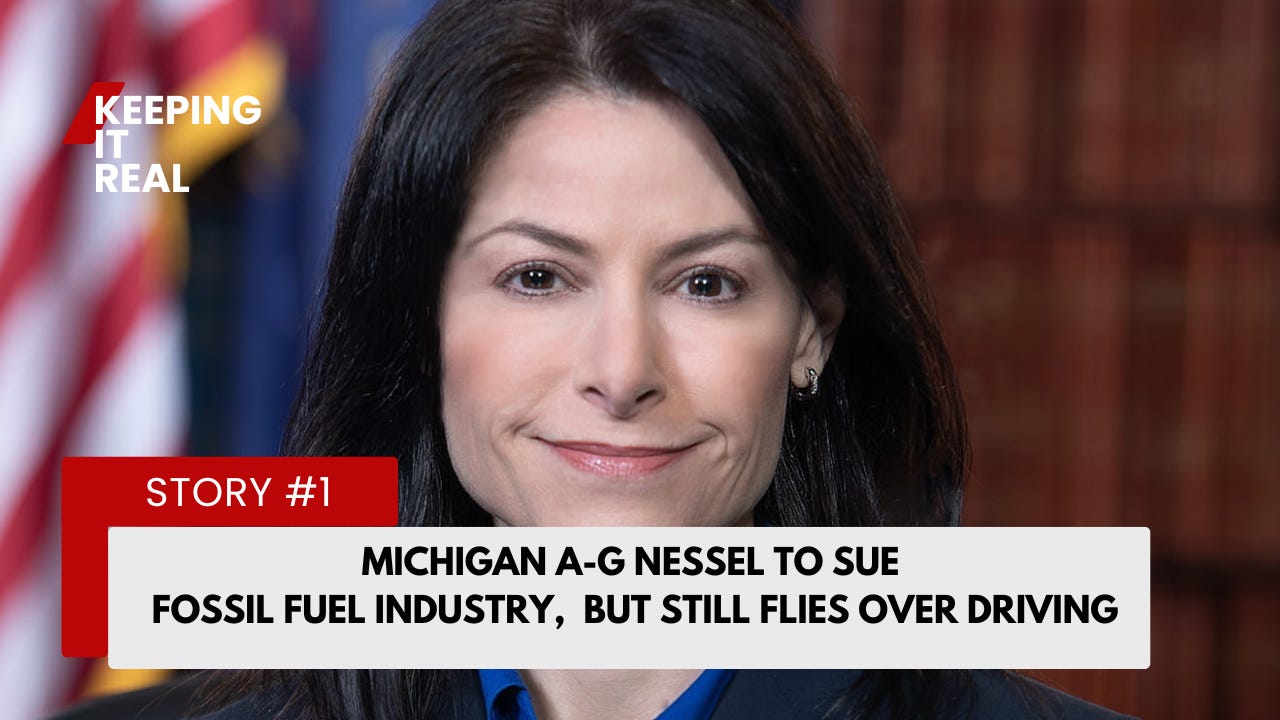Support my independent journalism and keep this free newsletter going by becoming a paid subscriber for just $5 a month. You can cancel anytime. I appreciate your support!


LANSING, Mich - Attorney General Dana Nessel said in a May 9 press release that Michigan intends to sue fossil fuel companies over alleged contributions to climate change, as CapCon previously reported.
Nessel claims these companies have had a climate impact, and she seeks private law firms to submit proposals to partner with the state to sue oil and gas firms for that alleged impact.
“The fossil fuel industry, despite knowing about these consequences, prioritized profits over people and the environment,” Nessel claimed in a press release. “Pursuing this litigation will allow us to recoup our costs and hold those responsible for jeopardizing Michigan’s economic future and way of life accountable.”
Results from a Mackinac Center records request sent to the attorney general’s office show that Nessel travels on a state-owned plane instead of driving. Nessel took seven flights powered by fossil fuels from January 2022 through May 2024. Two were commercial flights to Washington, D.C., and back; five were within Michigan. All were taxpayer-funded at a total cost of $6,202, public records show. Click here to read more.

WASHINGTON D.C. - Annual health care spending in the U.S. is projected to reach $7.7 trillion by 2032, according to new federal actuaries projections, marking a $2.9 trillion increase from last year.
Spending is expected to grow 5.6% annually during the 2023-2032 projection period, surpassing the anticipated 4.3% annual inflation rate. By 2032, healthcare will account for nearly 20% of GDP, up from 17.3% in 2022, the actuaries said.
In 2023, spending is estimated to have grown 7.5%, reflecting the “increases in the use of health care” after the COVID-19 public health emergency ended.
These predictions come as health care spending and health insurance enrollment trends are expected to be influenced by provisions enacted in response to the COVID-19 public health emergency from 2023-2032. Click here to read more.

WASHINGTON D.C. - On Wednesday, President Joe Biden used a post to X to push gun storage laws, a “high capacity” magazine ban, and the ability to sue firearm manufacturers over the criminal use of guns. The ability to sue gun makers over the criminal use of firearms has been a consistent push during Biden’s tenure in the White House and was a key component to his gun control platform when he campaigned for office.
For instance, on February 24, 2020, Breitbart News reported on a presidential campaign stop in South Carolina where Biden referenced gun manufacturers and said, “I’m going to take you down.” Click here to read more.

PORLAND, OREGON - A construction worker at the University of Oregon told the radio host they were told to remove an American flag from a construction crane.
“We have asked (the University of Oregon) for comment or explanation,” Larson said. “So far, nothing.”
Regardless, the construction company is apparently owned by patriots.
Larson said his source confirms that the star-spangled banner still flies in spite of the school’s objections. Click here to read more.

NASHVILLE, Tenn. (WSMV/Gray News) - Half a year after a deadly EF-2 tornado tore through Tennessee, many residents who were living in the path of destruction are still there, without permanent homes.
For people like Bonnie Hux, their properties remain frozen in time after the high winds tore through.
“I was visiting family in Florida, my mom was here, and I had seen her on the news, and we were all worried about her,” Hux said as she recalled the events on Dec. 9, 2023.
Hux and her mother both live on Nesbitt Lane in Madison. When the tornado hit, her mother and her mother’s house were both OK. Unfortunately, she was not so lucky with her own home.
“I come back, and I have no house,” Hux said.
Hux is by no means alone. Dozens of properties remain as they were the day after the destruction. Click here to read more.




















